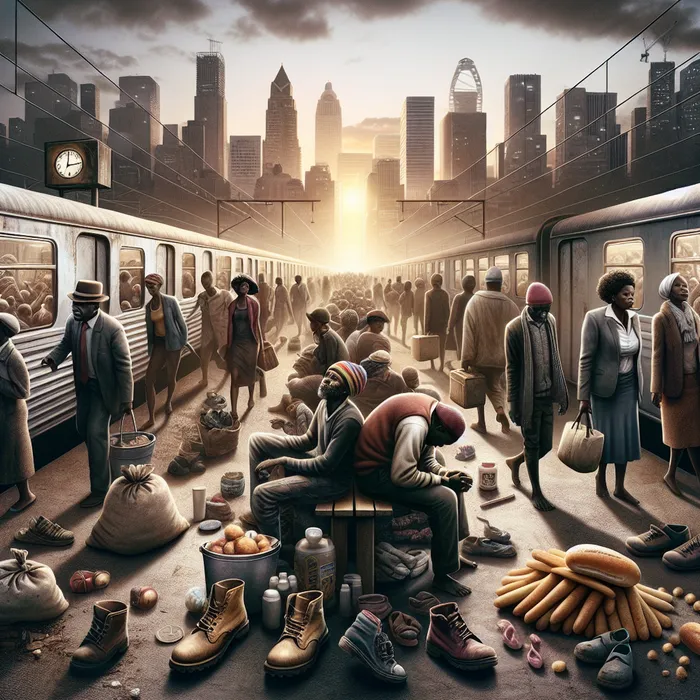The plight of South Africa's working poor: A call for systemic change

Despite, their daily labour, they remain trapped in poverty, says the writer.
Image: AI RON
Every day, millions of South Africans (young and old) rise before dawn to travel long distances for work. They board overcrowded trains and buses before sunrise, traveling long distances from the outskirts into the cities; often in conditions that feel unsafe.
They do so just for survival, to put bread on the table, have clothes on their backs, keep lights on, and to have shelter. Yet despite their efforts, they are rarely rewarded with stability or hope for upward mobility.
Despite, their daily labour, they remain trapped in poverty. These are the called the ‘working poor’, individuals who are ‘technically’ employed, yet unable to afford even the most basic necessities such as food, shelter, and transport. For them, work brings neither dignity nor stability, and certainly not a way out of hardship. Their condition is not the result of laziness or lack of effort, but deep-rooted structural inequalities and a government that continues to fall short in addressing their plight.
According to Statistics South Africa’s most recent labor report, the working poor accounts to over 3.3 million people (these stats excludes undocumented informal worker and casual workers), who are employed in the informal sector. These includes domestic and retail workers, security guards, street vendors, Service sector workers such as waitrons, manufacturing, mine, farm workers as well as cleaners.
These jobs lack benefits like medical aid, paid leave, or pensions, and are frequently part of the informal economy, where labor laws offer little to no protection. In many instances, these workers are employed without any formal employment contract or any binding agreement, which means they have no legal safeguards, and little recourse when faced with exploitation or dismissal. Furthermore, these workers are often not registered with the Unemployment Insurance Fund (UIF) or pension fund schemes, meaning they have no financial safety net to fall back on in times of crisis. If they lose their jobs, fall ill, or reach retirement age, they receive nothing.
We saw during the COVID-19 pandemic just how vulnerable these groups were. Despite an announced set of safety net interventions, those at greatest risk of hardship were informal and precarious workers, people suddenly sitting at home under a “no work, no pay” reality. The government tried to cushion the blow with temporary increases to social grants and a special grant for unemployed individuals not receiving any other income. Indeed, the private sectors did their part too. All these efforts were critical, but also highlighted the deep structural vulnerabilities in our economy, especially for the working poor.
When it comes to demographics, majority of the working poor are black women. These women face the dual burden of earning a living while also carrying the primary responsibility for unpaid household and caregiving duties. The working conditions for the poor are often physically demanding and mentally exhausting. Many endure long hours, typically ranging from 9-12 hours a day, with little to no rest and often without any form of overtime compensation. They routinely work well beyond the legally regulated working hours.
In sectors such as in mining, street vending, private security, and construction, workers often operate in unsafe and unregulated environments. They are regularly exposed to health hazards, physical strain, and a high risk of injury, often without access to protective equipment or proper training. These harsh conditions not only take a toll on their health and well-being, but also leave them with little time or energy to invest in anything else be it education, skills development, or personal development; all of which have proven to be keys to escaping poverty.
Over the years the government has implemented various policies aimed at supporting vulnerable workers. One of the most significant interventions was the introduction of the National Minimum Wage (NMW) in 2019, intended to raise income levels and reduce exploitation among low-paid workers. More recently, in 2024, Minister of Employment and Labor Thulas Nxesi announced an increase in the minimum wage from R25.42 to R27.58 per hour, reflecting an effort to keep pace with inflation and rising living costs. In addition to wage policies, the state provides social grants, which includes the Child Support Grant and the Old Age Pension, which offer essential support to millions of eligible households.
While these efforts provide some level of relief, they are not enough to lift the working poor out of poverty or to create sustainable economic security for them and their families. The minimum wage, though improved, still falls short of what is required to meet the full cost of living. Social grants, while crucial, are limited in amount and cannot substitute for sustainable, safe and decent employment.
To truly address the crisis faced by the working poor, South Africa needs more than a short-term relief it requires bold, comprehensive, and systemic interventions. Many employers continue to bypass minimum wage regulations or deny workers basic protections, knowing very well that enforcement is weak or nonexistent.
In addition, a major step forward would be the formalisation of informal workers domestic workers, street vendors, day laborers, and others whose jobs often fall outside the scope of legal protections. This means not only recognising these workers officially, but ensuring they have access to social protections like unemployment insurance, sick leave, and retirement savings. Government could, for example, introduce mobile registration systems or work with community organizations to bring informal workers into the fold without excessive red tape.
Too many are trapped in low-paying, unstable work because they lack opportunities to retrain or upskill. Public-private partnerships can help bridge this gap by offering community-based training programs linked to real job pipelines whether in technology, construction, care work, or green economy sectors.
* Ramontja is a Research Assistant at Institute for Pan-African Thought and Conversation
Cape Argus